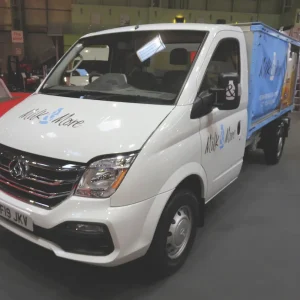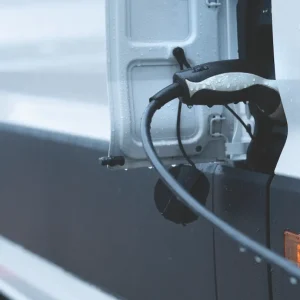Zero-emission battery-electric vans increasingly look set to become the tools of choice for last-mile urban delivery work, as cities impose ever-tighter restrictions on conventionally powered light commercials over the next few years. Using electric vans may be fine if all they are doing is transporting packages and parcels; but what if they are carrying chilled or frozen food?
Electric fridge units have been developed to be fitted to them – Thermo King’s multi-temperature E-200 is a case in point – but customers may be understandably concerned that the current they draw will reduce a battery-powered van’s range. It is a concern that CoolKit says it has addressed with a conversion based on an electric Maxus eDeliver 3.
The Burnley-based firm has provided the vehicle’s 4.8m3 load area with a heavy-duty insulation kit with the aim of minimising the consumption of cooling energy. While the electric fridge unit certainly draws power from the van’s propulsion battery pack, a solar panel has been fitted to the vehicle’s roof to help counteract the power drain.
Net result? The eDeliver 3 can still achieve a range of over 180 miles between battery recharges, claims CoolKit, while being able to transport frozen goods at -24°C.
CoolKit’s efforts helped net it the highly commended accolade in the converter section of the 2022 What Van? Awards.
Businesses that nevertheless still suffer from range anxiety, and fear that ranges will be sharply curtailed by grim winter weather, hilly terrain and high payloads, can always opt for an electric fridge powered by a separate 12V battery.
With premises in Barnoldswick, Lancashire, CoolVan has come up with an eDeliver 3 graced by an Le151C chiller unit from GAH said to deplete a fully-charged 12V battery by no more than 8% during the working day. Installing such a battery reduces a van’s payload capacity by around 15kg to 20kg, but means that any impact on its range is minimised.
CoolVan is determined to develop the most efficient electric refrigerated van possible, and has won over £500,000 of government funding to help it achieve its goal. In doing so it is working in partnership with the University of Warwick, Siemens and an unnamed specialist refrigeration engineering company.
The funding is being sourced from the Office for Zero Emission Vehicles in partnership with Innovate UK.
As well as eliminating exhaust emissions, electric vans and fridge units offer another important environmental benefit. They are quiet, which means that out-of-hours deliveries can be made to businesses premises with less risk that the slumbering residents of nearby houses will have their beauty sleep interrupted; and complain about it.
CoolKit and CoolVan are by no means the only businesses active in the electric fridge van sector.
Vantastec has started offering temperature-controlled conversions based on battery models such as Nissan’s e-NV200, while last year saw Tipton’s leasing and rental company Freezerent begin to offer a refrigerated Mercedes-Benz eSprinter 3.5-tonner. The vehicle has been developed in conjunction with GAH, Lancashire-based body builder Solomon Commercials and Mercedes-Benz dealership Midland Truck & Van.
Fitted with an electric GAH SRF271e fridge unit powered by independent lithium-ion batteries so as not to compromise eSprinter’s modest 96-mile range, the single-compartment van has been designed for chilled applications. The weight of the fridge unit, load area insulation and the independent and traction batteries means that payload capacity is modest too, at just 500kg; a limitation prospective operators will need to take into account.
The idea of using solar power to help power electric fridge units advanced earlier may be catching on.
Thermo King dealer Marshall Fleet Solutions (MFS) is busy promoting the TITAN hybrid power package. “It provides consistent power to the refrigeration system, reducing fuel costs, noise and, most importantly, emissions,” says MFS managing director, Mark Howell.
The solar-kinetic version uses solar panels combined with a kinetic energy recovery system to produce much of the top-up power the units need, storing it in on-board lithium batteries until it is required. The kinetic recovery unit converts braking energy into electrical energy, and the whole bundle can be deployed in a diesel-powered van.
The solar model relies solely on the panels along with the batteries, which can be charged overnight, and can be mounted on electric light commercials. TITAN can also be used to power other items on a vehicle, including the tail lift if one has been installed.
The distance their light commercials need to cover mean that not all businesses are as yet ready to switch to electric models.
KFF delivers frozen, chilled and ambient food to wholesalers and hospitality outlets around south east England and the Midlands. Covering up to 240 miles a day, each of the 18 refrigerated diesel Iveco Dailies it acquired last year is equipped with a dual-compartment Solomon body and a Hubbard 380SBAT fridge unit that relies on two compressors.
One is mounted in the engine compartment and kicks in when the vehicle is in motion. Its stablemate sits under the body and can be connected to an external electrical power source while the Daily is parked.
The evaporator sits on the cargo area’s ceiling and has been designed to minimise the amount of load space it takes up.
Elsewhere, Euro Foods has added half-a-dozen diesel Mercedes Sprinters to its fleet.
Like KFF, it delivers frozen and chilled foodstuffs, and the Sprinters are fitted with dual-compartment insulated bodies built by Solomon with Carrier Transicold Viento 350 units. The Viento controls the temperature in the frozen front compartment, from which air is drawn through ducting in the roof to chill the rear compartment.
If you want a real challenge, then try transporting ice without ending up with it all melting. That’s the task Bristol catering ice supplier Jam Inns Ice is faced with every day, in a hilly city bedevilled by heavy traffic; and it has just acquired an Isuzu Truck 3.5-tonner to help it tackle the job.
Used to deliver around 10t of ice at – 20°C daily, the newcomer boasts an insulated body built by Paneltex equipped with a GAH SRF351 freezer with an electric standby.
The body can be reconfigured for dual-compartment work, if it is required, by deploying a moveable bulkhead stowed in the roof. Other features include a lockable sack barrow holder integrated into the nearside rear door and rear frame.
The home delivery explosion and the extent to which consumers now order their groceries online has created a boom in orders for temperature-controlled light commercials. The past 12 months have seen converters and body builders specialising in the sector, and having to recruit more staff in order to keep up.
Solomon and CoolKit have both been on the recruitment trail, with the latter announcing last year that it was putting more vans into stock – including electric models – ready for conversion to keep up with the increase in demand.
Solomon has invested over £2m in a new 18,000ft2 production facility at its head office and has just opened its seventh factory, in Darwen, Lancashire. This means the business now has over 240,000ft2 of factory space able to turn out over 3,500 vehicles annually.
Solomon sales director, Anthony Clegg says: “We’ll be able to produce up to 1,500 a year in Darwen alone.”
He clearly has home delivery fleets in his sights. “The e-commerce sector has been growing each year, with more and more companies looking to operate online,” he observes.
Refrigerated light commercials are not solely used to transport food and allied products. Pharmaceuticals required by animals as well as humans have to be delivered under temperature-controlled conditions too.
CoolKit has been busy converting 34 Volkswagen Crafters for use by animal pharmaceuticals distributor Covetrus. Because of what the business delivers their load areas are for the most part maintained at a controlled ambient temperature, with a small separate area especially for items that have to be kept at chilled temperatures.
Specialising in supplying independent chemists with pharmaceuticals, Lexon has been replacing all 130 of its vans with a mixture of Ford Transits, Iveco Dailies and Fiat Professional Ducatos converted by Coolfreeze of Manchester.
They boast Hubbard SFZ008 or SFZ009 fridge units. The latter comes with twin evaporators to cool specific, separate compartments.
Directly driven by the vehicles engines, and equipped with electric stand-bys, the fridges are all mounted beneath their bodies.
Depending on how they are installed, under-mount fridge units are potentially vulnerable to getting plastered in road dirt, including road salt in winter, and to damage caused by sleeping policemen and kerbs if the driver mounts a pavement too enthusiastically. Mounting them on the roof can affect the vehicle’s aerodynamics and thus its fuel consumption however, and can make them vulnerable to being bashed by overhead obstructions; and does little to enhance the van’s appearance.
Precious few, if any, temperature-controlled light commercials are equipped with fridge units driven by separate diesel-fired donkey engines; so there is one issue operators will not have to worry about.
Used for many years by transport firms running refrigerated heavy trucks, such engines use what is commonly known as red diesel, which is subject to a far lower rate of duty than the so-called white diesel used to fuel vehicle engines. Red diesel is being abolished on 1 April however, so donkey engines will have to run on increasingly-expensive white diesel instead.
The change will undoubtedly result in higher operating costs for the businesses affected; and is sure to prompt them to consider other ways to power their refrigeration units.





